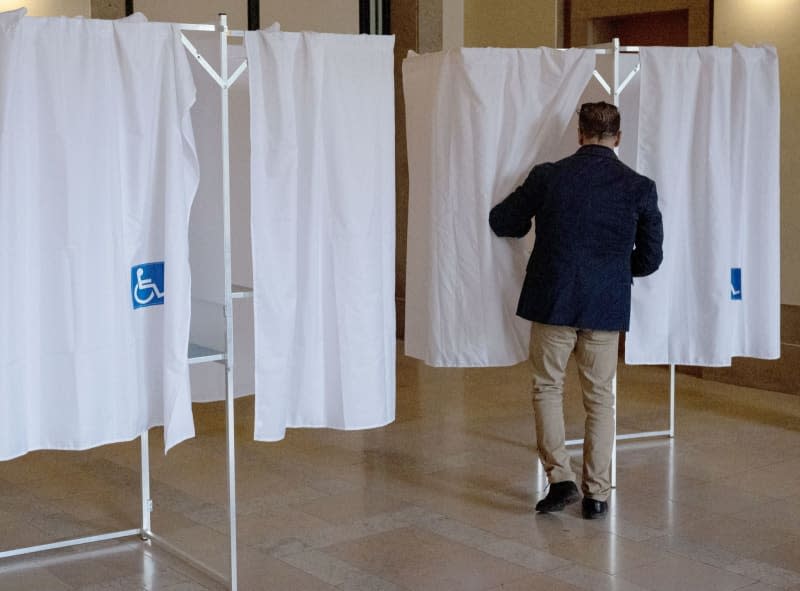The left-wing Popular Front (NFP) said it had a mandate to govern after it won a surprise victory in the second round of France’s parliamentary elections on Sunday, dropping the far right to third place, according to initial forecasts.
The NFP, a new alliance that Jean-Luc MélenchonThe far-left party La France Insoumise (France Unbiased), the Socialist Party, the Communist Party, the Ecologists and several smaller left-wing groups are expected to win 172 to 215 of the 577 seats in the lower house, or National Assembly, broadcasters TF1 and France 2 predicted after polls closed on Sunday.
“The president has a duty to call on the New Popular Front to govern,” said Jean-Luc Mélenchon after the first forecasts were published on Sunday evening, showing his alliance at the top.
He appealed to the Prime Minister Gabriel Attal from the chairman Emmanuel Macron‘s centrist camp to leave, and not long after, his wish seemed to come true when Attal announced Monday morning that he would resign from Macron.
Macron should admit defeat, Mélenchon said, while ruling out negotiations on a merger with Macron’s Ensemble (Together) camp.
Socialist Party leader Olivier Faure also said there should be no “coalition of contradictions” continuing Macron’s policies, while Green Party leader Marine Tondelier said it was a clear victory for the NFP. “We have won and now we are going to govern,” she claimed in Paris.
“Tonight social justice won, tonight environmental justice won, tonight the people won and now it’s just beginning,” Tondelier said.
But the math doesn’t favor the NFP, or indeed any camp: Macron’s centrist alliance came in second and is projected to win 150-180 seats, down from 245; the far-right Rassemblement National party, which emerged victorious after the first round, dropped to third place and is projected to win 120-152 seats. If the predictions are correct, it is therefore unlikely that any camp will win an absolute majority of 289 seats.
At 67.5%, voter turnout was significantly higher than in previous years.
France’s divided left-wing party united only a few weeks ago to form the NFP for early parliamentary elections. There is a split within the left, particularly over Mélenchon’s leadership.
The populist, who stands out for his Eurosceptic statements and is clearly pro-Palestinian, has even received a lot of criticism within his own party.
The left alliance has no clear leadership and no common program.
Rassemblement National suffered from a coordinated campaign by the groups that had come second and third in the first round, who struck a deal in about 200 seats to put forward a single candidate in the hope of keeping the far-right candidate out.
The ploy worked, sending National Rally leader Jordan Bardella into a rage, lashing out at Macron’s centrist camp and the NFP as a “single party” and an “alliance of dishonor.”
Bardella criticised the “electoral arrangements” that have “plunged France into the arms of Jean-Luc Mélenchon”, the leader of the far-left.
“The momentum that the Royal Navy has been able to maintain, which allowed them to gain a large lead in the first round and double their number of alternates, are essential elements for tomorrow’s victory,” said Bardella.
Macron’s office said the president was focused on forming a government. Before making any decisions, the head of state will await the final election results and the final composition of the lower house of parliament, the National Assembly, the Élysée Palace announced.
“In his role as guardian of our institutions, the President will ensure that the sovereign choice of the French people is respected,” the report said.
The Élysée Palace also said the number of lawmakers needed for an absolute majority must be reached, BFMTV reported. “The question will be whether a coalition with coherence can be formed to reach the 289 deputies” in the 577-seat chamber.
In view of the expected election result with Macron’s centrist alliance in second place, the Élysée declared: “The centre camp was declared dead: but it is still there, even after seven years in power.”
If the result is confirmed, it leads to different future scenarios: the left could try to gain support from the centrist forces – either as a minority government under a trust and supply arrangement with other parties or in some kind of grand coalition. Given the opposing political orientations, however, it is not clear whether this could succeed.
It is unclear whether Macron would be politically forced to appoint a prime minister from the ranks of the left in such a scenario. The National Assembly has the power to overthrow the government.
With a prime minister from the left, Macron would have to share power under an arrangement known in France as cohabitation. The prime minister would become more important.
Should neither side find a governing majority, the current government could remain in power as a caretaker government or a government of technocrats could be appointed. In such a scenario, France would be threatened with political deadlock.
With the Olympic Games due to start in Paris on July 26, it is also possible that Attal’s government will remain in power for a few more weeks.
Driven by general dissatisfaction with the Macron government, Rassemblement National won the European Parliament elections in June with 31.36% of the vote. Macron called early parliamentary elections.
There are still more than two years to go until the next round of presidential elections in 2027, which Le Pen is favored to win. Macron cannot run for re-election.











